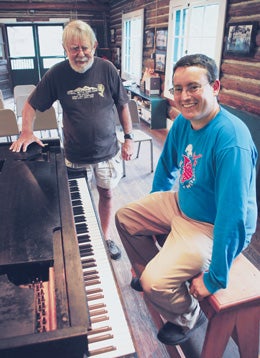
Among thousands of local choral groups, the Chorus of Westerly stands out, bringing generations of children and adults together to learn how to perform to exacting standards. The two men who have led it are living examples of how mentorship and music can profoundly shape a life.

By Paul E. Kandarian
Andrew Howell ’05 and George Kent ’58 walk the grounds of Ogontz Camp in the far reaches of Northern New Hampshire, a camp for music long owned and run by Kent and his wife, Lynn. It is where the two first met, Howell as a boy uncertain of his place in the musical world, Kent as a middle-aged man firmly ensconced in his.
In 1959, Kent began the Chorus of Westerly, an intergenerational assemblage of musicians and singers that has put on nearly 600 performances for more than 1.6 million people, locally and abroad, winning awards and accolades. In 2012, he retired as music director, turning over the reins to his protégé, Howell—who joined the chorus at the age of 13.
Kent is now 79, Howell 33—two men 46 years apart and hundreds of miles away from Westerly as they walk through Ogontz Camp, where young and old gather to learn, play and embrace music. But they are as close in spirit as teacher and student can be.
“He’s my mentor, without question,” says Howell, who also teaches at the camp, confessing that “I get sappy when I talk about him. Growing up, it was just my mom and me; my dad wasn’t in the picture. Mr. Kent has always been like a father to me.”
Kent founded the chorus to give children and adults equal share in singing major works of music from the world’s best composers, with members ranging in age from under 10 to well over 80. He ran it as music director until 2012, when he stunned the chorus with word of his retirement.
“That was big news; none of us expected it,” Howell says, adding with a laugh, when asked if he thought he could take over: “Of course! I’ve been thinking that since I was 13. I just hope the kids now are thinking the same thing about me.”
Kent’s decision to retire wasn’t hard, or planned, he says.
“It was just time,” Kent shrugs. “I just decided, and didn’t even tell my wife right away. I was at a meeting, and someone told her by text.”
The chorus has performed nearly 100 major choral works, always with fully professional orchestras, presenting more than a dozen major American premiers. International venues have included Smetana Hall in Prague, Westminster Abbey in London, St. Stephen’s Cathedral in Vienna and St. Peter’s Basilica in Rome.
Its regional traditions include Summer Pops, an event drawing 25,000 people, and the “Celebration of Twelfth Night,” with more than 350 performers. More than 2,500 people have been singing members of the chorus, 1,500 of them singing as children. The chorus has its own venue—the George Kent Performance Hall—and is one of only two independent American choral organizations to own its space, and the only one in the United States that combines adults and children in all its performances. An as-yet untitled documentary film about the chorus by filmmaker Caswell Cooke Jr. will be released soon.
None of which would have happened if not for Kent’s choppers. As a boy growing up in Pawcatuck, Conn., he had buck teeth and was advised by his dentist to take up the trumpet, figuring the mouthpiece would help push them straight.
“It worked, pretty much,” Kent laughs, who was also taking piano lessons at the time.
His piano skills found him work playing jazz in local nightclubs, probably, he says, “Because I was one of only three piano players in town.”
He went on to find his path as a professor at URI. “That’s where I got serious about music,” he says. So he founded the chorus 57 years ago, creating a rich cultural resource for his community and a launching pad for many musicians. Former member Bill Thorpe, who now performs as a professional singer and actor, says: “For my generation of young singers, George Kent not only provided a solid musical foundation with exposure to high-quality music, the opportunity to sing in foreign languages, and to perform with professional orchestras and soloists, but also a major social outlet that included im-portant interaction with adults.”
Professional musician Peter Niedmann of West Hartford, Conn., who sang and studied organ under Kent, says the transition to Howell has been smooth. “He is an outstanding choral conductor. His approach is very exacting; timing cutoffs perfectly, diction, variations in tone color. The chorus has a great new leader and a strong future.”
Not bad considering Howell never considered music as a boy, until he was forced to take piano lessons by his mother.
“Then I came here, and it turned my life around,” Howell says of attending Ogontz as a 12-year-old boy. A year later, he joined the chorus. “It gave me a home surrounded by people enjoying the same thing. No matter where you’re from, we all had this thing that made us one.” •
For more on the Chorus and its ambitious yearly schedule, which includes tours abroad, classical concerts, Christmas and Summer Pops, and summer camp for children, visit chorusofwesterly.org.
Photos: Paul Kandarian; courtesy Westerly Chorus
 Home
Home Browse
Browse Close
Close Events
Events Maps
Maps Email
Email Brightspace
Brightspace eCampus
eCampus


